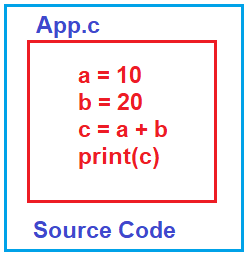Back to: C Tutorials For Beginners and Professionals
Platform Dependency in C Language
In this article, I will briefly introduce Platform Dependency in C Programming Language and why C applications are run on a single platform. Please read our previous article, which discusses the Different Types of Software Applications we can develop using different programming languages.
Platform Dependency in C Language
Whenever we install C software, depending on the Operating System, we need to download and install it. Let’s say we want to install C on Windows and Mac Operating System. Windows understands .exe, and MAC understands .dmg file. We also know that all the programming languages are stand-alone applications only. So, we need to download and install it based on the Operating System.
Whenever we install C software, a Compiler (to compile the application and generate machine code) and a Library (to develop the application) will be installed in the system. The Windows compiler will work for the Windows operating system only, and the MAC compiler will work only for the MAC operating system.
What is Platform Dependency?
Windows compiler will do a favor for Windows only, and the MAC compiler will do a favor for the MAC system only. This is known as Platform Dependency. That means if we develop one application using the Windows Operating System and if that application can only be executed on the Windows Operating System and cannot be run on other Operating Systems like Mac and Linux, this is called platform dependency. The Programming Languages used for developing such applications are called Platform Dependent Languages. C and C++ are Platform-Dependent Programming Languages.

Consider one simple C program, just the source code for adding two numbers, as shown below. Let’s name the program App.C.

Now, we need to compile the above source code. As a developer, we can understand the source code, but the machine cannot understand the source code. What the machine understands is the binary code. This source code will be passed to two different operating systems. Different operating system compilers will be working for the respective operating system.
- Windows: For Windows, the Windows Compiler will create the App.exe file. This App.exe file will work only on Windows OS and not other OS.
- Mac: For Mac, the Mac compiler will create an App.dmg file. This App.dmg file will work only on MAC OS and not other OS.
For a better understanding, please have a look at the below diagram.

C Language Platform Dependency
The C programming language, while known for its efficiency and control, has aspects of platform dependency. This means that the behavior of a C program can vary depending on the hardware and operating system on which it’s running. Here are some key factors contributing to the platform dependency of C:
- Data Type Sizes: The size of data types in C can vary between platforms. For example, the size of an int might be 32 bits on one system and 64 bits on another. This variability can affect data storage and arithmetic operations in a program.
- Endianness: Different systems follow different endianness conventions (big-endian or little-endian), defining the order of memory bytes. This affects how data is interpreted when read from or written to a binary file or over a network.
- Character Set: The representation of characters (like ASCII or Unicode) can vary. This affects how text and characters are processed.
- File Handling: File systems and handling methods can differ across platforms (like Windows and UNIX/Linux), leading to differences in file operations.
- Standard Library Differences: While the C Standard Library is consistent across platforms in theory, there can be subtle differences or additional extensions provided by specific implementations. These differences can lead to platform-specific behavior.
- Compiler Implementations: Different compilers may implement certain features of the C language differently, leading to variations in program behavior or compatibility. This means a program compiled with one compiler might not compile or behave the same way with another, especially if the program uses compiler-specific extensions or features.
- Operating System Specifics: C programs often interact with the operating system, and these interactions can be platform-dependent. System calls, file handling, memory management, and other OS-level operations can vary between Windows, Linux, or macOS operating systems.
- Hardware Architecture: C code can be affected by the underlying hardware architecture, such as the processor’s instruction set (e.g., x86, ARM), data type sizes (like the size of int, long, pointer), and endianness (big endian vs little endian). These differences can affect how a program handles data and memory.
- Floating-Point Representation: How floating-point numbers are represented and handled can vary, affecting calculations and precision.
- Memory Allocation: The mechanism for memory allocation and management (like stack size) can differ, impacting the program’s memory usage.
- Conditional Compilation: Programmers often use conditional compilation (using preprocessor directives like #ifdef, #ifndef, etc.) to write platform-specific code within the same program. This allows the program to compile and run on multiple platforms and introduces platform-specific code paths.
Reduce Platform Dependency
To write portable C code that runs consistently across different platforms, programmers often:
- Use Standard Libraries: Stick to standard C libraries and functions as much as possible.
- Avoid Platform-Specific Code: Refrain from using system-specific features unless absolutely necessary.
- Conditional Compilation: Use preprocessor directives to compile different code segments for different platforms.
- Standard Data Types: Utilize fixed-size data types (like int16_t, uint32_t from stdint.h) for consistent size across platforms.
- Testing and Validation: Test the code on different platforms to ensure consistent behavior.
In the next article, I will give you an overview of Introduction to C Programming Language. Here, in this article, I try to explain Platform Dependency in C, and I hope you like this Platform Dependency in C article. I would like to have your feedback. Please post your feedback, questions, or comments about this article.

You demystified the concept very well.